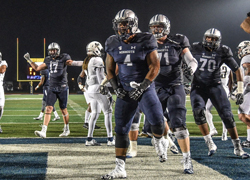In a world where social media can sway presidential elections and world events, surely it can influence sports. This fact has been proven time and time again as professional athletes have demonstrated their two cents on issues on sites such as Twitter and Facebook. But professional athletes aren’t the only ones who are networking online with millions of high school and college athletes alike joining the club. Coaches are taking notice to this as well.
As the social media frenzy grows and tweets are becoming more of our daily language, a look at their effect on the world of sports is our focus this week, especially after a recent scholarship scandal at Michigan University.
Yuri Wright, a four star rated corner back from Don Bosco Prep in New Jersey, was committed to the University of Michigan to play for head coach Brady Hoke. But after careful consideration and investigation into his character, the school chose to release Wright of his scholarship and right to be a Wolverine. As news broke of this event, sources confirmed that it was mainly in regards to racist and foul language used on the networking site Twitter.
From a top-notch college prospect bound for a successful future to a character tainted high school athlete, Wright has fallen out of the good graces of many. After the events unfolded, Wright narrowed down his choices to his local Rutgers University and Colorado.
After careful consideration, and possibly the mindset to run far away from the problem, Wright chose to play near Denver’s Tebow-country for Colorado University. In my view, he’s lucky to have the chance to suit up again after his filthy comments.
The soon-to-be Colorado Buffalo corner-back brought a huge burden not only on himself but on the issue of morality and whether (seemingly) private information should determine scholarship opportunities. It also begs the question of whether social media makes or breaks our view of athletes.
People in support of the events that unfolded would suggest that looking into one’s Twitter and/or Facebook account can only help the program. As they delve deep into the character to make sure the athlete is a good ambassador to the college, the truth comes out. This helps coaches understand who they’re dealing with and gives them an idea of what they might have to put up with for another four years.
Critics would then suggest that anything on one’s online account is personal information and is not to be tampered with and used to determine play on the field. They also suggest that it is an invasion of privacy and needs to be corrected. Is it hard enough to keep people out of personal lives? And is it so hard to allow your play on the field earn you a spot on a notable college squad?
Although all of these claims are accurate in our technology-driven world, my response to this is clear. Brady Hoke and the coaching staff of the Michigan University Wolverines made an excellent decision in denying Wright’s bid to be on the squad.
First off, it is no different than attending a public athletic event, analyzing character and possibly chatting with the recruit. Instead, this is accessing information online which is made public once the author submits the material. Whether or not your Twitter is set to private, there’s no saying where your embarrassing tweets or wall posts might get you.
Is it that hard to keep your racist comments and embarrassing grammar off the web? Keep that your own personal issue and be professional and admirable while you’re in pursuit of a scholarship that thousands of others would kill for.
So here’s a tip to Yuri Wright and all of those athletes who have, or intend to create embarrassing and meaningless comments; coaching staffs look for leadership qualities and character traits that will make you respected at an adult level. If you are Division-1 quality, or any form of an NCAA athlete, you do not need to be using your Twitter as your inner thoughts mechanism.
Be respectful, be enthusiastic and show the world what you can do with it in the palm of your hands. Let’s refrain from using derogatory comments about sex or skin color on a public platform, as we are in 2012; the age of information.
Let’s not blame these findings as deceits or privacy invasions, because as the freedom of information age spreads, it will only get worse. There will be more Yuri Wright-like comments on Twitter or Facebook in the future but hopefully the next time around it will be from someone who surely knows the consequences.
This, of course, applies to professional athletes as well, who although make millions, decide to tamper their reputations with idiotic or hurtful tweets. Or, for attention getters like Chad Ochocinco, social media is their last grip to stardom. My advice: please, ignore the hype, know the power and be professional.
Please, be the careful thinking Brady Hokes of the world and realize what social media can make of you. Don’t deny its power and beware of its effect on others. Now there’s some food for thought.




